The Pequod Arrives in Home Port: Jake Heggie’s ‘Moby-Dick’ at San Francisco Opera
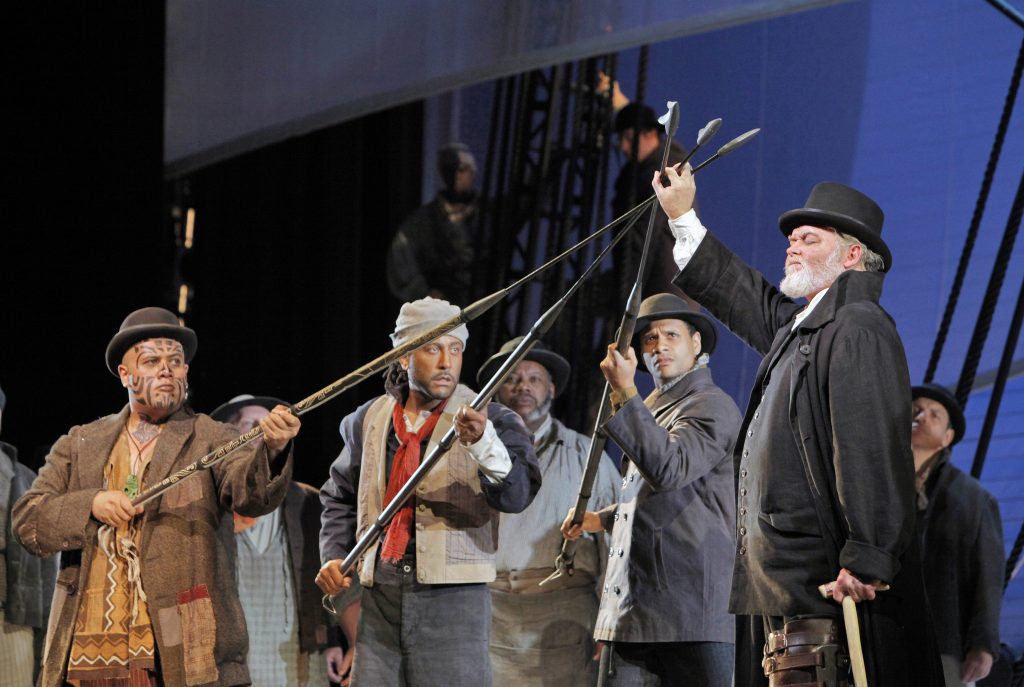
Moby-Dick: Jonathan Lemalu (Queegueg), Bradley Kynard (Daggoo), and Carmichael Blankenship (Tashtego) with Jay Hunter Morris (Captin Ahab). Photo by Cory Weaver.
San Francisco Opera, October 10, 2012
Jake Heggie, Moby-Dick
Review by JANOS GEREBEN
It took John Adams’ Nixon in China a 25-year-long voyage around the world to arrive at its birthplace for the first production in San Francisco. Jake Heggie’s Moby-Dick had a similar journey, but only two years’ worth.
The two operas share not only their place of origin; they are both contemporary works with grand, traditional musical values, and the rare promise of staying in the repertory for the foreseeable future. Beyond that, of course, their subjects and styles are vastly different, and Adams’ many musical innovations have no counterpart in Moby-Dick.
Heggie’s work — with Gene Scheer’s libretto based on Herman Melville’s universally-known, rarely read book — is by far his biggest and best. It is gorgeous, romantic music, perhaps too much so. Ahab’s struggle with the “damn whale” is similar to the gut-wrenching ugly drama of Elektra’s revenge — with music to match Richard Strauss’s stunning listeners with a few brief, utterly beautiful passages lighting up the dark horror of a matricide-in-the-making.
In Heggie’s treatment of Ahab’s insane destruction of crew and ship, those proportions are reversed: 90 percent lyrical beauty, 10 percent stark drama, and even that isn’t exactly a punch in the stomach. It’s a wonderful soundtrack, but perhaps more fitting for another movie.
What almost makes up for the relative lack of unambiguous tragedy is a great physical production (Leonard Foglia’s direction, Robert Brill’s sets, Elaine J. McCarthy’s projections), Patrick Summers’ masterful direction of an orchestra on fire (woodwinds excelling above all), and a dynamite cast. Without such excellence of execution, the work itself would show more dramatic weakness.
The first act flows well, the second act stalls at times as arias and duets create resting points in the forward motion. But the finale, Greenhorn’s survival and transformation into Ishmael, is close to perfection.
Even with other important roles, the opera basically is a duet between Jay Hunter Morris’ Ahab and Morgan Smith’s Starbuck — and the two performances are superb. Morris handles the high-tessitura role effortlessly, Smith — heard here before only as Prince Yamadori — is vocally and dramatically striking, very impressive.
In two welcome local debuts, Jonathan Lemalu’s Queequeg and Stephen Costello’s Greenhorn sing and act memorably, individually and together, in believable bonding. Another debut, Talise Trevigne as Pip the cabin boy, is also excellent, she rules the stage, even as doing a Peter-Pan flying act by way of swimming/drowning.
Adler Fellow Joo Won Kang is the commander of the Rachel, his voice booms from offstage apparently without amplification as it’s not noted in the program. Every one of the dozen named roles deserve individual mention as there is no weak link in the cast. Similarly, it would be right and proper to name every member of the chorus and orchestra — a performance to treasure even more than the work itself.
See David Gregson’s review of the San Diego production.
Review of opera when Ben Heppner was replaced by Jay Hunter Morris.
CAST
CAPTAIN AHAB: JAY HUNTER MORRIS
STARBUCK: MORGAN SMITH
QUEEQUEG: JONATHAN LEMALU *
PIP: TALISE TREVIGNE *
FLASK: MATTHEW O’NEILL
STUBB: ROBERT ORTH
PRODUCTION CREDITS
COMPOSER: JAKE HEGGIE
LIBRETTIST: GENE SCHEER
CONDUCTOR: PATRICK SUMMERS
DIRECTOR: LEONARD FOGLIA
SET DESIGNER: ROBERT BRILL
COSTUME DESIGNER: JANE GREENWOOD
LIGHTING DESIGNER: DON HOLDER
PROJECTION DESIGNER: ELAINE J. MCCARTHY *
CHORUS DIRECTOR: IAN ROBERTSON
CHOREOGRAPHER / MOVEMENT DIRECTOR: KETURAH STICKANN
* SAN FRANCISO OPERA DEBUT
Wed 10/10/12 7:30pm
Sat 10/13/12 8:00pm *
Thu 10/18/12 7:30pm *
Sun 10/21/12 2:00pm *
Tue 10/23/12 8:00pm
Fri 10/26/12 8:00pm
Tue 10/30/12 7:30pm
Fri 11/2/12 8:00pm

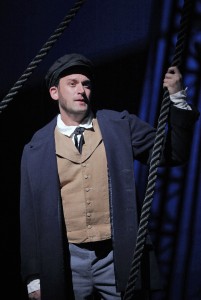
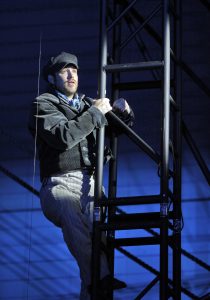
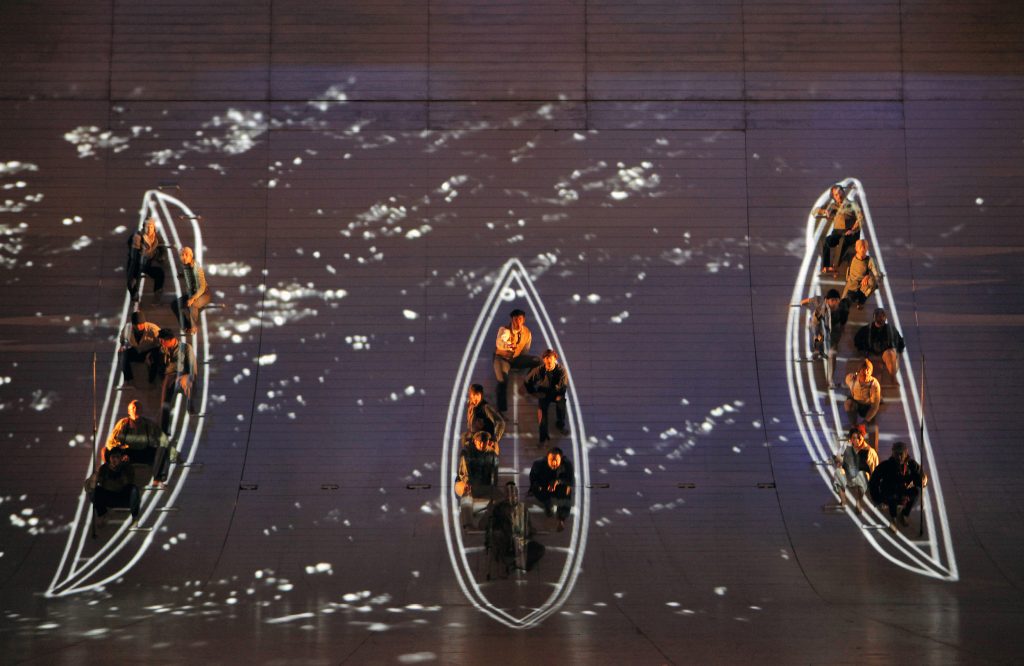
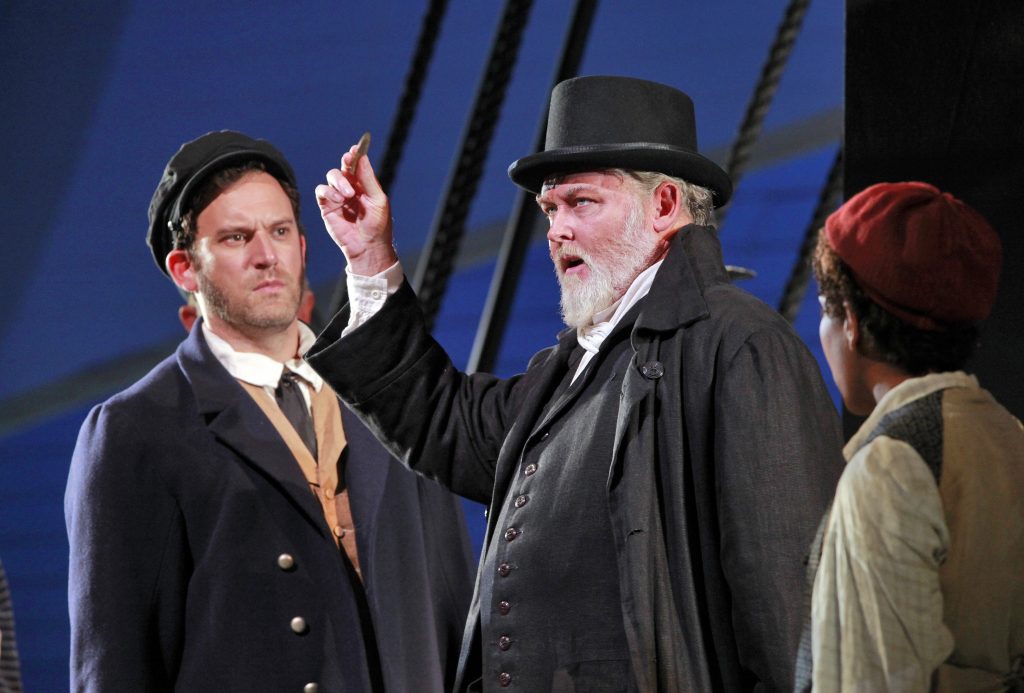
Having seen this opera twice at San Diego Opera, I agree with David’s observation about Heggie’s weakness in portraying the final conflict and tragic destruction of the ship and crew in the “Moby Dick” story. But the rest of the opera engages the listener on many levels.
We must give credit to Heggie, however, for knowing how to pick his material and give it a good run for the money. “Dead Man Walking” also lacked dramatic punch in the pit, but his fluent arioso style story carried the opera in spite of this flaw. Compare Heggie to Andre Previn, who took a promising vehicle, “A Streetcar Named Desire,” and managed to turn a great play into one of the most musical evenings imaginable.
I meant to end my comment “one of the most boring musical evenings imaginable.”